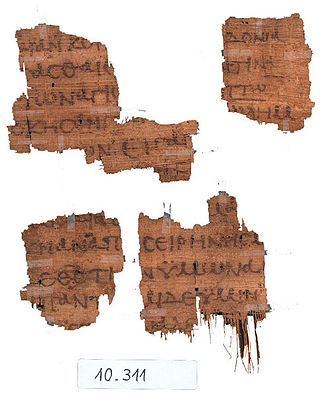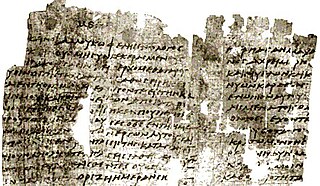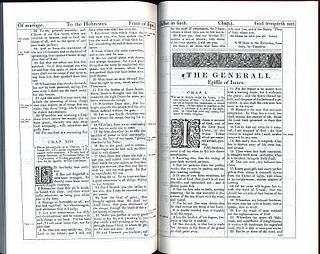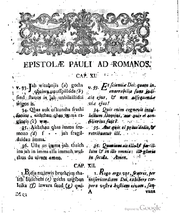Romans 9 is the ninth chapter of the Epistle to the Romans in the New Testament of the Christian Bible. It is authored by Paul the Apostle, while he was in Corinth in the mid-50s AD, with the help of an amanuensis (secretary), Tertius, who adds his own greeting in Romans 16:22. This chapter is concerned with Paul's vindication of "the faithfulness of God".

Romans 2 is the second chapter of the Epistle to the Romans in the New Testament of the Christian Bible. It was written by Paul the Apostle, while he was in Corinth in the mid-50s AD, with the help of an amanuensis (secretary), Tertius, who adds his own greeting in Romans 16:22. Biblical scholar William Sanday observes that although "the main theme of the Epistle [is] the doctrine of justification by faith", in verse 6 Paul "lays down with unmistakable definiteness and precision the doctrine that works, what a man has done, the moral tenor of his life, will be the standard by which he will be judged at the last day".

Romans 3 is the third chapter of the Epistle to the Romans in the New Testament of the Christian Bible. It was composed by Paul the Apostle, while he was in Corinth in the mid-50s AD, with the help of an amanuensis (secretary), Tertius, who added his own greeting in Romans 16:22.

Romans 4 is the fourth chapter of the Epistle to the Romans in the New Testament of the Christian Bible. It is authored by Paul the Apostle, while he was in Corinth in the mid-50s AD, with the help of an amanuensis (secretary), Tertius, who adds his own greeting in Romans 16:22. The focus of this chapter is on Abraham, whose faith "was accounted to him for righteousness". The Geneva Bible's chapter summary states that "ten times in the chapter [Paul] beateth upon this word, Imputation.
Romans 10 is the tenth chapter of the Epistle to the Romans in the New Testament of the Christian Bible. It is authored by Paul the Apostle, while he was in Corinth in the mid-50s AD, with the help of an amanuensis (secretary), Tertius, who adds his own greeting in Romans 16:22. Paul continues his discussion of Israel's rejection of God's purpose which he had commenced in chapter 9: despite his "anguish over Israel", it remains his "heart's desire and prayer to God for the Israelites, that they may be saved".

Romans 12 is the twelfth chapter of the Epistle to the Romans in the New Testament of the Christian Bible. It is authored by Paul the Apostle, while he was in Corinth in the mid-50s AD, with the help of an amanuensis (secretary), Tertius, who adds his own greeting in Romans 16:22. According to Martin Luther,
In chapter 12, St. Paul teaches the true liturgy and makes all Christians priests, so that they may offer, not money or cattle, as priests do in the Law, but their own bodies, by putting their desires to death. Next he describes the outward conduct of Christians whose lives are governed by the Spirit; he tells how they teach, preach, rule, serve, give, suffer, love, live and act toward friend, foe and everyone. These are the works that a Christian does, for, as I have said, faith is not idle.
Romans 14 is the fourteenth chapter of the Epistle to the Romans in the New Testament of the Christian Bible. It was authored by Paul the Apostle, while he was in Corinth in the mid-50s AD, with the help of an amanuensis (secretary), Tertius, who adds his own greeting in Romans 16:22. Protestant Reformer Martin Luther summarised this chapter as Paul's teaching that "one should carefully guide those with weak conscience and spare them; one shouldn't use Christian freedom to harm, but rather to help, the weak", while Lutheran theologian Johann Albrecht Bengel says that Paul "refers all things to faith". Craig Hill suggests that Paul has drawn on his "recent Corinthian correspondence" in this part of the epistle.

Romans 15 is the fifteenth chapter of the Epistle to the Romans in the New Testament of the Christian Bible. It is authored by Paul the Apostle, while he was in Corinth in the mid-50s AD, with the help of an amanuensis (secretary), Tertius, who adds his own greeting in Romans 16:22. According to Martin Luther,
In chapter 15, St. Paul cites Christ as an example to show that we must also have patience with the weak, even those who fail by sinning publicly or by their disgusting morals. We must not cast them aside but must bear with them until they become better. That is the way Christ treated us and still treats us every day; he puts up with our vices, our wicked morals and all our imperfection, and he helps us ceaselessly. Finally Paul prays for the Christians at Rome; he praises them and commends them to God. He points out his own office and the message that he preaches. He makes an unobtrusive plea for a contribution for the poor in Jerusalem. Unalloyed love is the basis of all he says and does.

2 Corinthians 6 is the sixth chapter of the Second Epistle to the Corinthians in the New Testament of the Christian Bible. It is authored by Paul the Apostle and Timothy in Macedonia in 55–56 CE.

Hebrews 10 is the tenth chapter of the Epistle to the Hebrews in the New Testament of the Christian Bible. The author is anonymous, although the internal reference to "our brother Timothy" causes a traditional attribution to Paul, but this attribution has been disputed since the second century and there is no decisive evidence for the authorship. This chapter contains the exposition about Christ's effective sacrifice and the exhortation to continue in faithfulness and expectancy.

Hebrews 13 is the thirteenth chapter of the Epistle to the Hebrews in the New Testament of the Christian Bible. The author is anonymous, although the internal reference to "our brother Timothy", caused a traditional attribution to Paul. This attribution has been disputed since the second century, and there is no decisive evidence for the authorship. This closing chapter contains the author's concluding exhortations, final benediction and epistolary postscript.
Isaiah 1 is the first chapter of the Book of Isaiah, one of the Book of the Prophets in the Hebrew Bible, which is the Old Testament of the Christian Bible. In this "vision of Isaiah concerning Judah and Jerusalem", the prophet calls the nation to repentance and predicts the destruction of the first temple in the siege of Jerusalem. This chapter provides an introduction to the issues of sin, judgement, and hoped-for restoration which form the overarching structure of the whole book. It concludes with 'a reference to the burning of those who trust in their own strength', in a fire which cannot be 'quenched', a relatively rare word which is also used in the last verse of the book, thereby linking together beginning and ending of this whole book. It is traditionally read on the black sabbath immediately preceding the 9th of Av fast day.
Isaiah 6 is the sixth chapter of the Book of Isaiah in the Hebrew Bible or the Old Testament of the Christian Bible. This book contains the prophecies attributed to the prophet Isaiah, and is one of the Books of the Prophets. It records the calling of Isaiah to be the messenger of God to the people of Israel.
Isaiah 5 is the fifth chapter of the Book of Isaiah in the Hebrew Bible or the Old Testament of the Christian Bible. This book contains the prophecies attributed to the prophet Isaiah, and is one of the Books of the Prophets.
Isaiah 10 is the tenth chapter of the Book of Isaiah in the Hebrew Bible or the Old Testament of the Christian Bible. This book contains prophesies attributed to the prophet Isaiah, and is one of the Prophetic Books.
Isaiah 44 is the forty-fourth chapter of the Book of Isaiah in the Hebrew Bible or the Old Testament of the Christian Bible. This book contains the prophecies attributed to the prophet Isaiah, and is a part of the Books of the Prophets.

Isaiah 57 is the fifty-seventh chapter of the Book of Isaiah in the Hebrew Bible or the Old Testament of the Christian Bible. This book contains the prophecies attributed to the prophet Isaiah, and is one of the Books of the Prophets. Chapter 57 is the second chapter of the final section of the Book of Isaiah, often referred to as Trito-Isaiah.

Ezekiel 34 is the thirty-fourth chapter of the Book of Ezekiel in the Hebrew Bible or the Old Testament of the Christian Bible. This book contains the prophecies attributed to the prophet/priest Ezekiel, and is one of the Books of the Prophets. In this chapter, Ezekiel prophesies against the "irresponsible shepherds" of Israel and states that God will instead seek out God's sheep and become their "true shepherd". The Jerusalem Bible notes the continuity of this theme, occurring in Jeremiah 23:1–6, here in Ezekiel, and later resumed in Zechariah 11:4–17, as well as in the New Testament.

Jeremiah 11 is the eleventh chapter of the Book of Jeremiah in the Hebrew Bible or the Old Testament of the Christian Bible. This book contains prophecies attributed to the prophet Jeremiah, and is one of the Books of the Prophets. This chapter includes the first of the passages known as the "Confessions of Jeremiah".

Jeremiah 48 is the forty-eighth chapter of the Book of Jeremiah in the Hebrew Bible or the Old Testament of the Christian Bible. This book contains prophecies attributed to the prophet Jeremiah, and is one of the Books of the Prophets. This chapter is part of a series of "oracles against foreign nations", consisting of chapters 46 to 51. In particular, chapters 46-49 focus on Judah's neighbors. This chapter contains the poetic oracles against Moab.











